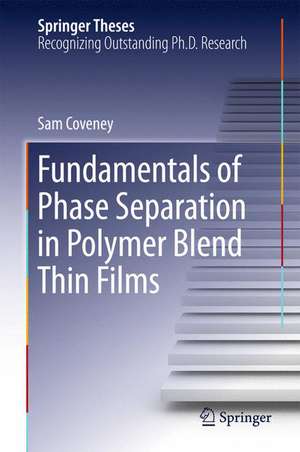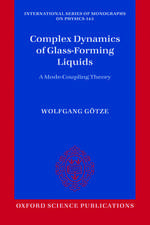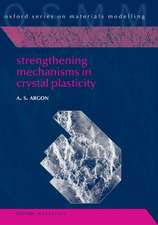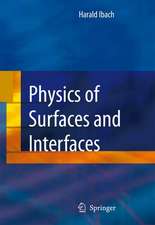Fundamentals of Phase Separation in Polymer Blend Thin Films: Springer Theses
Autor Sam Coveneyen Limba Engleză Hardback – 27 iun 2015
| Toate formatele și edițiile | Preț | Express |
|---|---|---|
| Paperback (1) | 635.15 lei 6-8 săpt. | |
| Springer International Publishing – 15 oct 2016 | 635.15 lei 6-8 săpt. | |
| Hardback (1) | 641.20 lei 6-8 săpt. | |
| Springer International Publishing – 27 iun 2015 | 641.20 lei 6-8 săpt. |
Din seria Springer Theses
- 5%
 Preț: 1154.07 lei
Preț: 1154.07 lei -
 Preț: 389.88 lei
Preț: 389.88 lei - 15%
 Preț: 646.94 lei
Preț: 646.94 lei - 18%
 Preț: 1220.45 lei
Preț: 1220.45 lei -
 Preț: 399.29 lei
Preț: 399.29 lei - 18%
 Preț: 997.88 lei
Preț: 997.88 lei - 18%
 Preț: 941.05 lei
Preț: 941.05 lei -
 Preț: 544.53 lei
Preț: 544.53 lei - 15%
 Preț: 643.16 lei
Preț: 643.16 lei - 15%
 Preț: 642.68 lei
Preț: 642.68 lei - 15%
 Preț: 639.25 lei
Preț: 639.25 lei - 20%
 Preț: 558.82 lei
Preț: 558.82 lei - 18%
 Preț: 943.43 lei
Preț: 943.43 lei - 18%
 Preț: 1116.26 lei
Preț: 1116.26 lei - 15%
 Preț: 640.06 lei
Preț: 640.06 lei - 15%
 Preț: 640.06 lei
Preț: 640.06 lei -
 Preț: 276.68 lei
Preț: 276.68 lei - 15%
 Preț: 636.45 lei
Preț: 636.45 lei - 18%
 Preț: 891.17 lei
Preț: 891.17 lei - 15%
 Preț: 640.88 lei
Preț: 640.88 lei -
 Preț: 389.70 lei
Preț: 389.70 lei - 20%
 Preț: 563.89 lei
Preț: 563.89 lei -
 Preț: 393.35 lei
Preț: 393.35 lei - 15%
 Preț: 637.93 lei
Preț: 637.93 lei - 15%
 Preț: 641.85 lei
Preț: 641.85 lei - 18%
 Preț: 1112.30 lei
Preț: 1112.30 lei - 20%
 Preț: 551.36 lei
Preț: 551.36 lei - 18%
 Preț: 1103.62 lei
Preț: 1103.62 lei - 18%
 Preț: 1109.92 lei
Preț: 1109.92 lei - 18%
 Preț: 1225.94 lei
Preț: 1225.94 lei - 18%
 Preț: 944.99 lei
Preț: 944.99 lei - 18%
 Preț: 944.19 lei
Preț: 944.19 lei - 15%
 Preț: 640.06 lei
Preț: 640.06 lei - 18%
 Preț: 1229.10 lei
Preț: 1229.10 lei - 15%
 Preț: 640.06 lei
Preț: 640.06 lei - 18%
 Preț: 1217.27 lei
Preț: 1217.27 lei - 15%
 Preț: 636.80 lei
Preț: 636.80 lei - 18%
 Preț: 1000.87 lei
Preț: 1000.87 lei - 15%
 Preț: 635.96 lei
Preț: 635.96 lei - 15%
 Preț: 640.88 lei
Preț: 640.88 lei -
 Preț: 387.20 lei
Preț: 387.20 lei - 18%
 Preț: 999.45 lei
Preț: 999.45 lei -
 Preț: 385.25 lei
Preț: 385.25 lei -
 Preț: 385.25 lei
Preț: 385.25 lei - 18%
 Preț: 1109.92 lei
Preț: 1109.92 lei - 18%
 Preț: 1110.72 lei
Preț: 1110.72 lei -
 Preț: 386.99 lei
Preț: 386.99 lei - 15%
 Preț: 637.13 lei
Preț: 637.13 lei - 20%
 Preț: 554.20 lei
Preț: 554.20 lei - 20%
 Preț: 555.57 lei
Preț: 555.57 lei
Preț: 641.20 lei
Preț vechi: 754.36 lei
-15% Nou
Puncte Express: 962
Preț estimativ în valută:
122.72€ • 127.78$ • 103.71£
122.72€ • 127.78$ • 103.71£
Carte tipărită la comandă
Livrare economică 10-24 martie
Preluare comenzi: 021 569.72.76
Specificații
ISBN-13: 9783319193984
ISBN-10: 3319193988
Pagini: 172
Ilustrații: XVI, 171 p. 60 illus., 11 illus. in color.
Dimensiuni: 155 x 235 x 2 mm
Greutate: 0.44 kg
Ediția:2015
Editura: Springer International Publishing
Colecția Springer
Seria Springer Theses
Locul publicării:Cham, Switzerland
ISBN-10: 3319193988
Pagini: 172
Ilustrații: XVI, 171 p. 60 illus., 11 illus. in color.
Dimensiuni: 155 x 235 x 2 mm
Greutate: 0.44 kg
Ediția:2015
Editura: Springer International Publishing
Colecția Springer
Seria Springer Theses
Locul publicării:Cham, Switzerland
Public țintă
ResearchCuprins
Development of Theory for Bulk Polymer-Blend Systems.- Development of Theory for Polymer-Blend Thin Films.- Hamiltonian Phase Portraits for Polymer-Blend Thin Films.- Lateral Phase Separation via Surface Bifurcation.- Coupled Surface Roughening and Phase Separation.
Notă biografică
This work sheds new light on fundamental aspects of phase separation in polymer-blend thin films. A key feature underlying the theoretical models is the unification of one-dimensional thermodynamic phase equilibria with film evolution phenomena in two- and three dimensions. Initially, an established 'phase portrait' method, useful for visualising and calculating phase equilibria of polymer-blend films, is generalised to systems without convenient simplifying symmetries. Thermodynamic equilibria alone are then used to explain a film roughening mechanism in which laterally coexisting phases can have different depths in order to minimise free energy. The phase portraits are then utilised to demonstrate that simulations of lateral phase separation via a transient wetting layer, which conform very well with experiments, can be satisfactorily explained by 1D phase equilibria and a 'surface bifurcation' mechanism. Lastly, a novel 3D model of coupled phase separation and dewetting is developed, which demonstrates that surface roughening shadows phase separation in thin films.
Textul de pe ultima copertă
This work sheds new light on fundamental aspects of phase separation in polymer-blend thin films. A key feature underlying the theoretical models is the unification of one-dimensional thermodynamic phase equilibria with film evolution phenomena in two- and three dimensions. Initially, an established 'phase portrait' method, useful for visualising and calculating phase equilibria of polymer-blend films, is generalised to systems without convenient simplifying symmetries. Thermodynamic equilibria alone are then used to explain a film roughening mechanism in which laterally coexisting phases can have different depths in order to minimise free energy. The phase portraits are then utilised to demonstrate that simulations of lateral phase separation via a transient wetting layer, which conform very well with experiments, can be satisfactorily explained by 1D phase equilibria and a 'surface bifurcation' mechanism. Lastly, a novel 3D model of coupled phase separation and dewetting is developed, which demonstrates that surface roughening shadows phase separation in thin films.
Caracteristici
Nominated as an outstanding Ph.D. thesis by the University of Sheffield, UK Offers an ideal presentation for new PhD student: focused review of the primary literature, results are developed organically from beginning to end Provides detailed derivation of diffusion equations with numerical implementation that reproduces simulations Full-color demonstration of phase portraits, a valuable tool for identifying equilibria in simulations Includes supplementary material: sn.pub/extras














